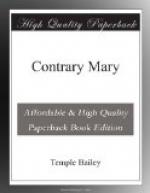But this year has taught me. I have seen you pushing away from you the things which would have charmed most women I have seen you pushing away wealth, and love for the mere sake of loving. I have seen you willing to work that you might hold undimmed the ideal which you had set for your womanhood. Loving and love-worthy, you have not been willing to receive unless you could give, give from the fulness of that generous nature of yours. And out of that generosity, you have given me your friendship.
And now; as I write the things which your clear eyes are to read, I am wondering whether that friendship will be withdrawn. Will you when you have heard of my losing battle, find anything in me that is worthy—will there be anything saved out of the wreck of your thought of me?
Well, here it is, and you shall judge:
I will skip the first years, except to say that my father was one of the New York Pooles who moved South after the Civil War. My mother was from Richmond. We were prosperous folk, with an unassailable social position. My mother, gracious and charming, is little more than a memory; she died when I was a child. My father married again, and died when I was in college. There were three children by this second marriage, and when the estate was settled, only a modest sum fell to my share.
I had been a lonely little boy—at college I was a dreamy, idealistic chap, with the saving grace of a love of athletics. Your brother-in-law will tell you something of my successes on our school team. That was my life—the day in the open, the nights among my books.
As time went on, I took prizes in oratory—there was a certain commencement, when the school went wild about me, and I was carried on the shoulders of my comrades.
There seemed open to me the Church and the law. Had I lived in a different environment, there would have been also the stage. But I saw only two outlets for my talents, the Church, toward which my tastes inclined, and the law, which had been my father’s profession.
At last I chose the Church. I liked the thought of my scholarly future—of the power which my voice might have to sway audiences and to move them.
I am putting it all down, all of my boyish optimism, conceit—whatever you may choose to call it.
Yet I am convinced of this, and my success of a few years proved it, that had nothing interfered with my future, I should have made an impression on ever-widening circles.
But something came to interfere.
In my last years at the Seminary, I boarded at a house where I met daily the daughter of the landlady. She was a little thing, with yellow hair and a childish manner. As I look back, I can’t say that I was ever greatly attracted to her. But she was a part of my life for so long that gradually there grew up between us a sort of good fellowship. Not friendship in the sense that I have understood




